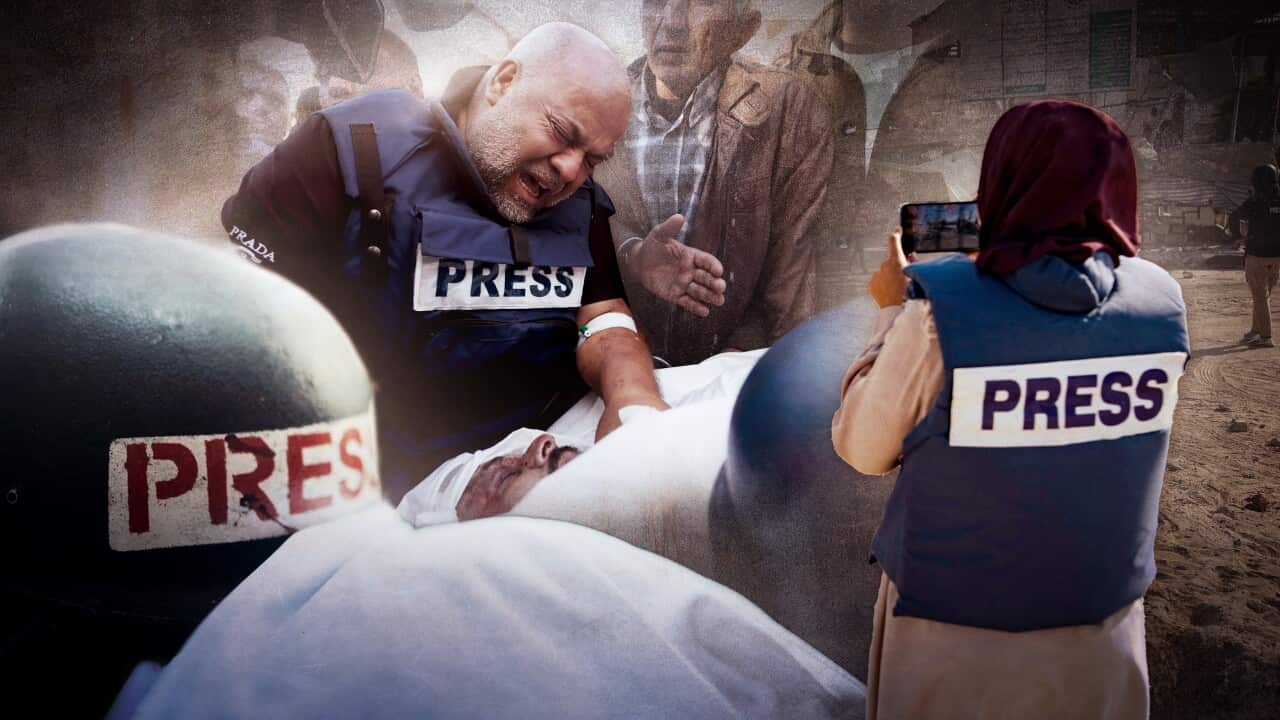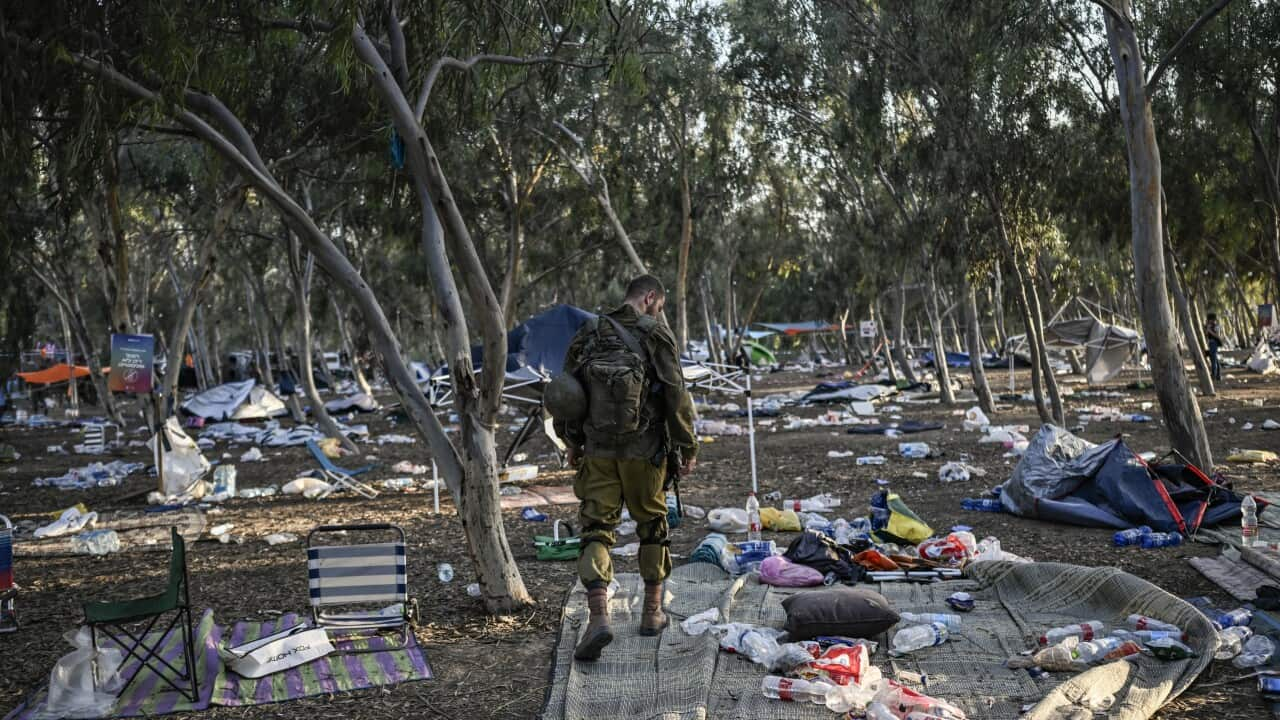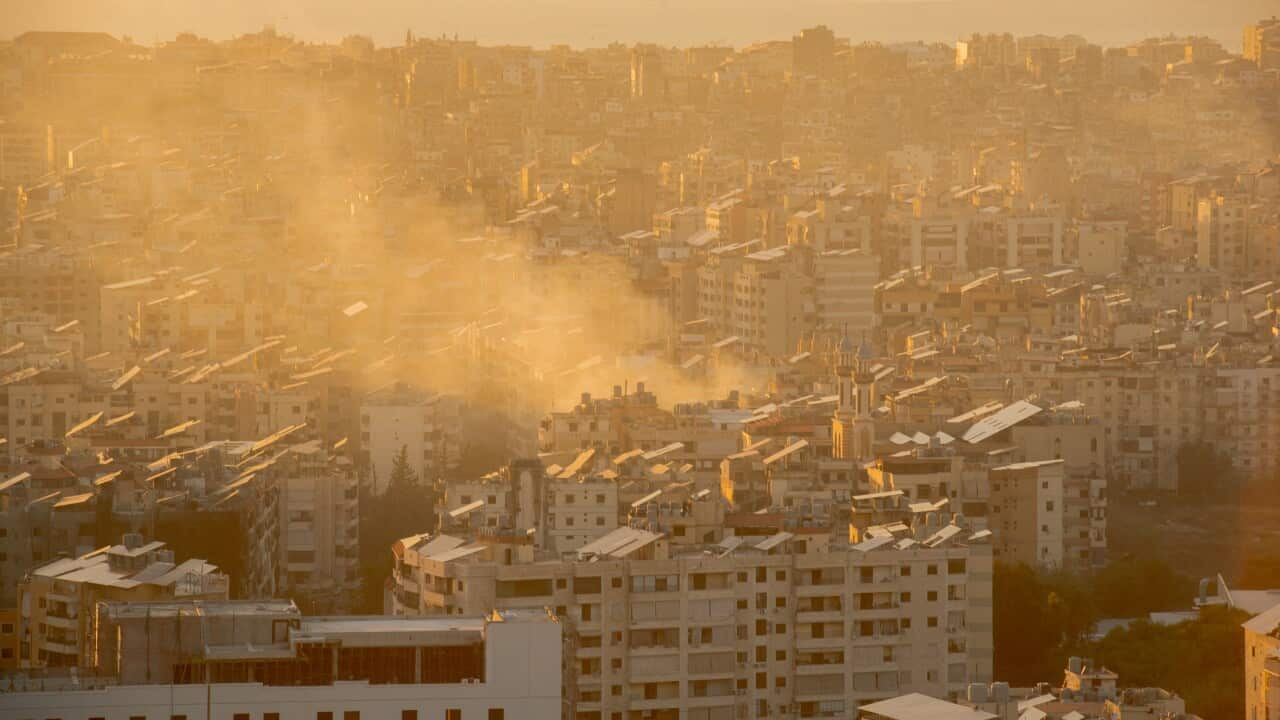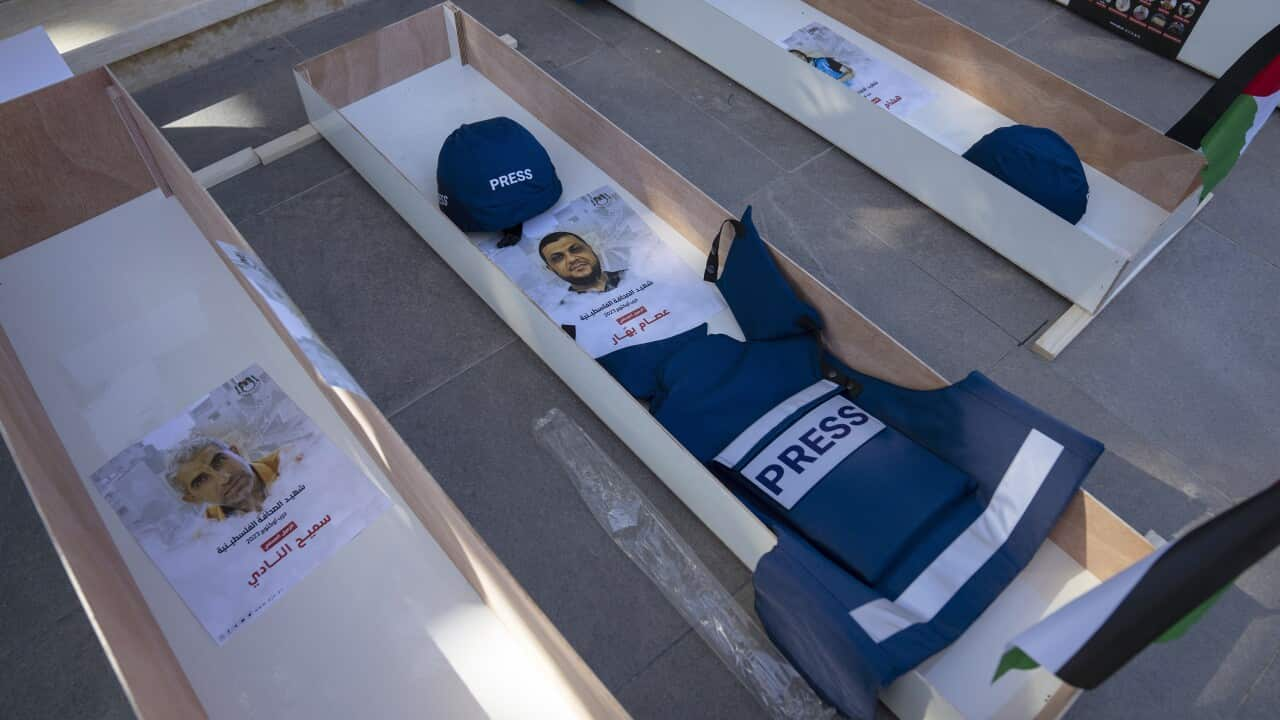

8 min read
'We collected him in pieces': The brutal reality of reporting from war-torn Gaza
The growing death toll of journalists in Gaza "represents the bloodiest period" for journalism, according to one organisation. Reporters there say they've received "threats on their lives" and are "scared" — but they're determined to keep working.
Published 18 October 2024 5:37am
By Rashida Yosufzai
Source: SBS News
Image: At least 128 journalists and media workers, all but five of them Palestinian, have been killed since October 7, according to the Committee to Protect Journalists, making it the deadliest period since it started recording journalist deaths in 1992. (AAP, SBS)
Key Points
- Along with aid workers, teachers, health workers and other professionals in Gaza, the Hamas-Israel war has exacted an unprecedented toll on media workers.
- At least 120 Palestinian journalists and media workers have been killed so far, the Committee to Protect Journalists (CPJ) reports.
- This makes it the deadliest period for media workers since CPJ began gathering data in 1992.
Standing at a hospital compound in Gaza, Emad Abushawiesh rattles off the names of media colleagues who have been killed or he's seen wounded this past year.
There was Tamer Lubbad, he says, and Hisham al-Nawajha, Mohammed Soboh, and Saeed Al-Taweel — and many more.
"All this [are] my friends — killed and injured," the Palestinian journalist tells SBS News.
"You can ask the ... Israeli army why it targets the journalists?
"To stop the journalist on the street and the Israeli army can kill all the people in Gaza without camera."
Israel strongly denies the claim it deliberately targets journalists. It says it targets neither civilians nor journalists in its pursuit of militants led by Hamas — the political and military group that rules Gaza — who killed around 1,200 people in Israel on October 7, sparking .
Israel's subsequent bombardment of Gaza has killed more than 42,000 Palestinians, according to the enclave's health ministry, and left much of the territory in ruins.
A range of organisations including press freedom groups, United Nations experts, journalist bodies, and human rights groups have raised concerns about Gaza's growing journalist death toll while calling for accountability from Israel's military.
'Deadliest period for journalists'
Along with aid workers, teachers, health workers and other professionals in Gaza, the Hamas-Israel war has exacted an unprecedented toll on media workers.
At least 128 journalists and media workers — all but five of them Palestinian — have been killed in the conflict, according to the Committee to Protect Journalists (CPJ), making it the deadliest period since CPJ began gathering data in 1992. Two Israeli journalists were killed on the 7 October attack.
CPJ classifies the killing of at least five journalists — four in Gaza and one in Lebanon — as targeted murders by the Israel Defense Forces (IDF), and says it is investigating at least 10 more cases of deliberate targeting.
CPJ said an example early in the conflict of Israel's military "deliberately targeting journalists for their work" was the 13 October strike on a group of seven clearly identifiable journalists filming in southern Lebanon.
It said the Israeli military fired two tank shells 37 seconds apart — instantly killing Reuters journalist Issam Abdallah and wounding the rest.

A man holds a photo of Reuters visual journalist Issam Abdallah during a vigil in tribute to the cameraman. Credit: epa
In response to CPJ's requests, Israel's military said it used tank and artillery fire to prevent a suspected "terrorist infiltration" and that the incident was under review.
The International Federation of Journalists (IFJ) says the growing death toll of journalists in Gaza "represents the bloodiest period" for journalism.
"According to IFJ's investigations in collaboration with our affiliate, the Palestinian Journalists Syndicate, Israel is deliberately targeting journalists in Gaza — the only ones that can report ongoing atrocities and challenge Israel's war narrative, amid Israel's ban on foreign media," IFJ general secretary Anthony Bellanger told SBS News.
"Twelve months into the war, if international justice delivers on its obligations, the leaders of Israel and Hamas should be in the dock facing charges ranging from war crimes to crimes against humanity. Many other political leaders should appear for complicity in those crimes."
'We all receive death threats'
Among the latest casualties in Gaza include camera operator Fadi Al Wahidi, who was critically injured with a bullet to the neck from an Israeli reconnaissance aircraft while he and his Al Jazeera colleague Anas Al-Sharif were covering an Israeli siege in northern Gaza on 9 October, according to the CPJ.
In videos shot by colleagues, Al Wahidi can be seen flat on the ground, not moving, as his distressed-sounding colleagues call out his name from metres away.
He was later taken to hospital but his colleagues say he is paralysed from his wounds and needs urgent evacuation from Gaza.

Camera operator Fadi Al Wahidi (left) and journalist Ahmed Hamdan (right) before Al Wahidi was seriously wounded while working. Credit: Supplied/Ahmed Hamdan
Before his injury, Al Wahidi had been covering the death of another colleague, 19-year-old freelance photographer Hassan Hamad.
Hamad was killed by a missile fired from an Israeli drone on 6 October, according to CPJ, which said it spoke to his father and employer, Media Town.
"We collected him in pieces," Hamad's friend and colleague, journalist Ahmed Hamdan told SBS News.
In videos filmed by Hamdan, Hamad's distressed father holds a shoe box containing his teenage son's remains outside a hospital, to prepare him for burial. Hamdan said they were able to identify his friend by the strands of his hair that were left.
CPJ reported that before his death, Hamad received death threats in April on his phone from an Israeli number.

Teenager Hassan Hamad (left) and his friend and colleague Ahmed Hamdan (right) before Hamad was killed on 9 October. Credit: Supplied/Ahmed Hamdan
"We all received threats on our lives."
"Hassan Hamad was reporting for us the movement of the military vehicles from his own house. The Israeli artillery targeted them, and he was instantly killed."
Israel's military denies targeting journalists
The IDF said it does not bear responsibility for the death threats allegedly sent to Hamad.
It said it takes all operationally feasible measures to mitigate harm to civilians including journalists.
"The IDF has never, and will never, deliberately target journalists," it told SBS News in a statement.
"Given the ongoing exchanges of fire, remaining in an active combat zone has inherent risks.
"The IDF will continue to counter threats while persisting to mitigate harm to civilians."
Journalists vow to continue working, despite risks
Freelance photographer Abushawiesh told SBS News he fears for his safety, but mostly for his children and family.
"Sometimes I can't complete my job, sometimes I'm afraid, I'm human and I'm scared," he admits, adding that journalists in Gaza have little in the way of protective gear.

Journalist Emad Abushawiesh says he fears for his safety but will continue to report to show the world what is happening in Gaza. Credit: Supplied/Emad Abushawiesh
"But I will complete my work in Gaza, and tell the people, tell all the people what's happening in Gaza, before [I'm] dead."
Abushawiesh spoke to SBS News on Sunday near a holding area for journalists at Al Aqsa Hospital.
A day later, , triggering a fire that engulfed the tents in the hospital courtyard where about 500 displaced Palestinians had been sheltering. Four people died in the fire, while 25 others were badly burned.
Israel's media crackdown
The CPJ has also called on Israel — which controls most of Gaza's land borders — to allow foreign media access to the Palestinian enclave, beyond escorted trips arranged by its military.
"This effective ban on foreign reporting has placed an impossible and unreasonable burden on local reporters to document a war through which they are living," an open letter, coordinated by the CPJ and signed by about 70 media and civil society organisations, said in July.
The CPJ has also previously raised concerns that restricted access has made it "exponentially harder" to confirm information about the war's impact on Gaza's media community and "by extension, about the broader impact of the war".
"The result is that and that the reporting which does get through is subject to repeated questions over its veracity," the open letter stated.
In April, Colleen Murrell, a full professor in journalism at Dublin University, wrote that the Israeli government had given 3,400 international journalists press accreditation since October 2023.
"This has given journalists access to the West Bank and enabled coverage of settler violence against the local Palestinian population, but not to Gaza," Murrell wrote in an article for The Conversation.
Around that time, Israel's parliament passed a law that gave the government powers to shut down foreign media outlets if it deemed them a security threat.
It then shut down Qatar-based Al Jazeera's operations in Israel in May — a move criticised by the media outlet as a "criminal act" but one Israeli Prime Minister Benjamin Netanyahu said was justified, having accused Al Jazeera of harming "Israel's security".
Then in late September, Israeli soldiers raided Al Jazeera's offices in occupied West Bank and ordered the office to shut for 45 days.





